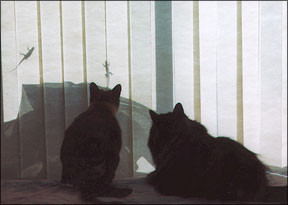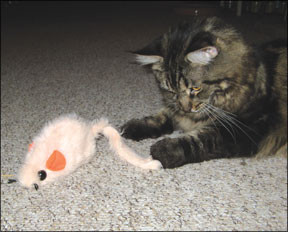Have you ever been awakened by a peculiar offering at your bedside? Perhaps a dead mouse, a bewildered insect, or even a slobbery toy? If you’re a cat owner, you’re likely familiar with these “gifts” from your feline companion. It’s a common scenario: your cat proudly presents you with something they’ve “caught,” and you’re left wondering, “Is this really a gift?” While our initial reaction might be to interpret these offerings as tokens of affection, the real meaning behind these Cat Gifts is far more fascinating and rooted in their natural instincts.
 Indoor Cat Hunting Instincts
Indoor Cat Hunting Instincts
Many cat owners have experienced the early morning “present” drop. One cat owner, Bev Caldwell, recounts a late-night call from her daughter, terrorized by her cat, Kit, who had presented her with both a dead and then a live mouse in quick succession. The initial, often instinctive, response is to praise the cat for their “generosity.” However, according to animal behavior experts, this might be a misinterpretation of your cat’s motivations. The idea that your cat is bringing you a gift in the human sense of the word might be far from the truth.
More Than Just a Mouse: Understanding the “Cat Gift”
Katherine A. Houpt, VMD, a renowned expert in animal behavior and the James Law Professor of Animal Behavior at Cornell University’s College of Veterinary Medicine, offers a different perspective. She explains that when your cat presents you with a mouse – or any other “gift” – it’s not necessarily an act of generosity. Instead, it’s more likely a lesson in hunting. “Your cat is actually bringing you a mouse to teach you to hunt and kill it,” Dr. Houpt states. This behavior mirrors the way a mother cat teaches her kittens the essential skills for survival.
Cats are born with a strong hunting instinct, a drive to chase and capture prey. However, the skill to effectively hunt, kill, and consume prey is a learned behavior. Mother cats play a crucial role in this education. Starting around four weeks of age, a mother cat will initiate hunting lessons for her kittens. This process begins with her bringing dead prey, like mice, back to the nest and consuming it in front of her kittens. This introduces the kittens to the concept of prey and encourages them to participate. Gradually, the mother cat progresses to bringing dead mice for the kittens to eat on their own.
The next stage is pivotal in developing their hunting prowess. The mother cat will then bring live, but wounded, mice. These injured creatures allow the kittens to practice their hunting skills in a controlled environment. The kittens learn to stalk, pounce, and eventually kill the slowed-down prey. This practice is crucial for developing coordination and judging distances, essential skills for successful hunting. As kittens gain experience, they start hunting alongside their mother, eventually becoming proficient hunters themselves by four to five months old. However, even with instinct and early lessons, experience matters. Research indicates that younger cats, around six to eight months old, are less successful at catching mammals compared to their older, more experienced counterparts.
This entire teaching process employed by mother cats is mirrored in the way your domestic cat might “gift” you with prey. They start by bringing dead animals, progressing to live ones, seemingly expecting their human companions to quickly grasp the hunting lesson. Interestingly, experts have observed that spayed female cats are more inclined to bring these “gifts” to their human families compared to male cats.
The “Gift” is a Lesson, Not a Token of Affection
 Cat Toy as Hunting Substitute
Cat Toy as Hunting Substitute
But how can we be sure this “cat gift” is truly a hunting lesson and not an offering of affection? Dr. Houpt points out, “There are very few instances in nature where animals bring gifts to each other.” Animal behaviors are primarily driven by survival and basic needs like eating. Your cat, in their own way, considers you a part of their social group, perhaps even seeing you as a somewhat inept feline companion in need of hunting education.
So, what’s the appropriate response when your cat presents you with a “gift” at your feet? While your first instinct might be to praise your cat, Dr. Houpt advises against it. “If you praise your cat, you’re encouraging her to bring you more mice,” she warns. Positive reinforcement in this situation can inadvertently strengthen a behavior you might not want repeated.
Instead of praise, Dr. Houpt recommends a neutral reaction. Avoid scolding your cat, as they are simply acting on their natural predatory instincts. The best approach is to “act as neutral as possible and quickly get rid of the mouse.” Avoid making a big deal out of the situation, whether positive or negative, as any strong reaction can be misinterpreted by your cat as encouragement to continue their hunting endeavors and “gift-giving.”
Dealing with a dead mouse can be unsettling, but a live mouse presents a different challenge. Dr. Houpt acknowledges, “It’s a problem. There’s no easy answer.” Distracting your cat might encourage them to drop the mouse. If the mouse appears unharmed and you live in a safe, rural area, releasing it outside might be an option. However, releasing a mouse in an urban environment may not be ideal for the mouse’s survival. For live mice, Dr. Houpt suggests, “If possible, take the mouse to your veterinarian or the animal shelter, where the experts will decide on the best course of action.” Caution is advised when handling mice, as they can bite and potentially carry diseases.
While experts understand why cats hunt and bring prey to their human companions, the question of why cats sometimes seem to “torture” their prey remains less clear. Dr. Houpt suggests, “It’s possible that this behavior represents pent-up aggression, especially in indoor cats.” If a cat’s hunting instincts are not adequately fulfilled, boredom and frustration can manifest in prolonged play with captured prey.
Reducing the “Gift” Delivery Service
While you can’t entirely eliminate a cat’s natural hunting instincts, there are steps you can take to minimize the “gift” deliveries:
- Bell Collar: Equipping your cat with a collar and bell can act as an early warning system for potential prey, giving them a chance to escape.
- Secure Home: Seal up potential entry points for rodents to reduce the opportunities for your cat to catch mice indoors.
- Indoor Cat at Night: If mice are a nocturnal problem, keeping your cat indoors, especially in your bedroom, at night could reduce nighttime encounters.
- Motion Toys: Provide your indoor cat with stimulating motion toys that mimic prey. This can help satisfy their hunting urges in a more acceptable way and redirect their focus away from live creatures.
Understanding the true nature of “cat gifts” – that they are more about instinct and teaching than affection – can help you react appropriately and manage this common feline behavior. By providing alternative outlets for their hunting instincts and reacting neutrally to their “gifts,” you can maintain a harmonious relationship with your feline friend, even when they bring you unexpected presents.
